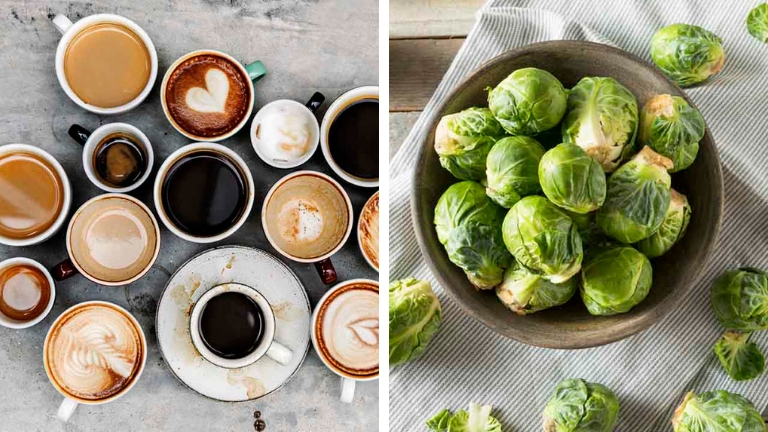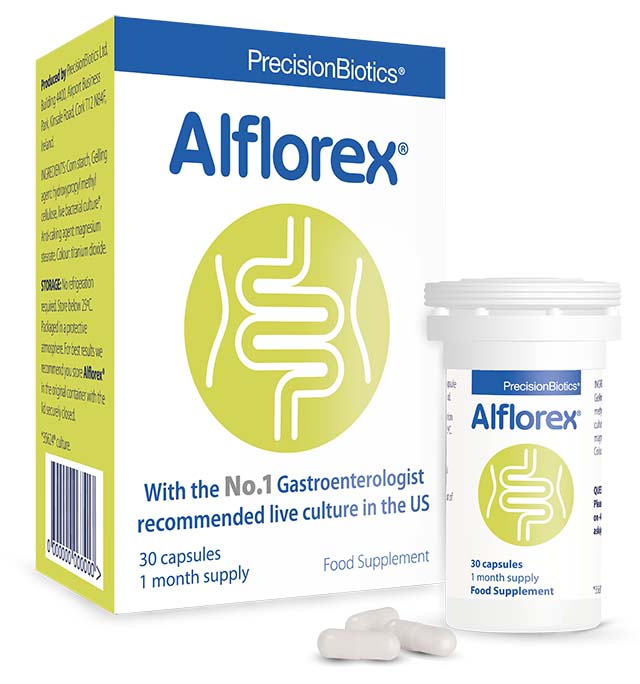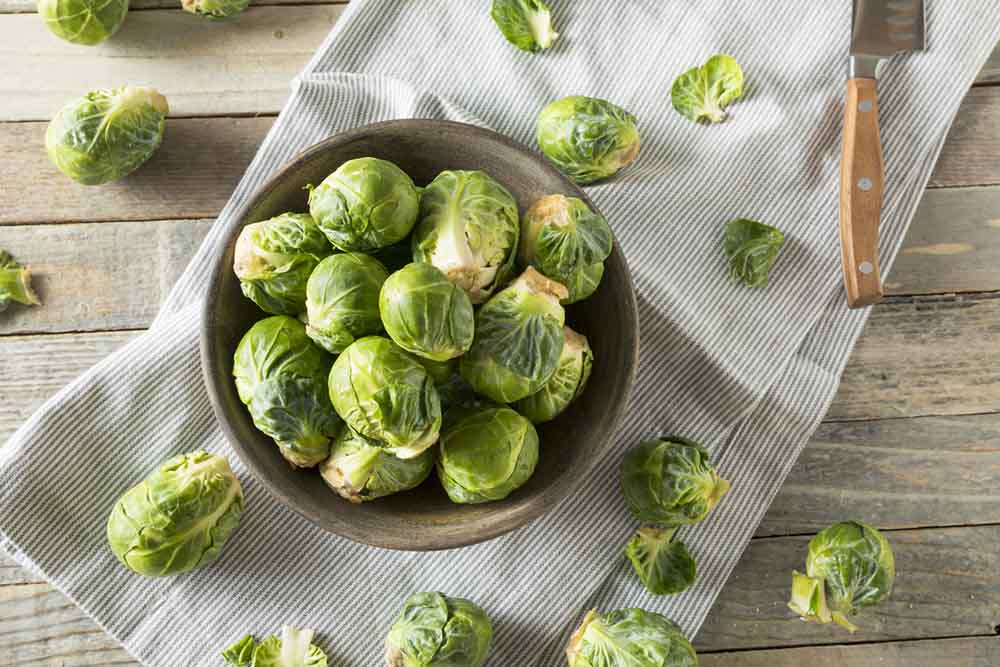IBS symptoms making your life hell? Dr Simon Smale, a leading gut health expert and trustee of the IBS Network provides 18 tiny life changes that help
Gut symptoms like bloating, flatulence, constipation and tummy cramps can literally make your life an uncomfortable living hell. And, it turns out some 10-20 percent of the population suffer from these common and uncomfortable IBS (Irritable Bowel Syndrome) symptoms.
What’s more shocking, a new survey by Healthista, commissioned by Alflorex, has found that a staggering 41 percent of us have symptoms of IBS but are yet to be diagnosed.
The research, which polled 1600 UK women aged 25-65 was published in Healthista’s first Gut Health Survey, to coincide with IBS Awareness Month in April.
Our survey findings can be read in detail here, with expert advice from Dr Simon Smale, consultant gastroenterologist and trustee of the IBS Network.
Gut health is a subject close to our hearts here at Healthista HQ, which is why we are doing a Gut Health Special throughout April that includes daily tips and tricks proven to help and weekly expert advice you can trust.
Read more: 30 gut health tips in 30 days
What is IBS?
IBS (Irritable Bowel Syndrome) ‘is a descriptive term for a collection of symptoms when the communication between the brain, the gut and the biome (in other words the bugs that live in our gut) don’t quite work properly,’ explains Dr Smale.
The connection between the three can go wrong for a number of reasons, such as the microbiome being disturbed by infection or a change in diet. It could also be due to changes in the sensitivity of the nerves and the way they transmit messages to the brain, explains Dr Smale.
Your environment and emotional state can also affect the sensitivity of your nerves which can have a significant impact on how the bowels function.
What are the most common IBS symptoms?
- Abdominal pain and discomfort
- Change in bowel habits
- Bloating
- Flatulence
- Fatigue
- Brain fog (poor concentration)
How common is IBS?
‘About a fifth of the population in any given year will complain of symptoms consistent with irritable bowel,’ says Dr Smale.
These days it’s hard to find anyone that doesn’t suffer from some or most of the miserable symptoms of IBS. So it’s not surprising that a vast 41 percent of women said they suffered with symptoms such as abdominal pain, bloating and flatulence.
What is surprising though is that they haven’t actually been diagnosed as having IBS. ‘The gut has only a limited number of symptoms it can give you to signal that something is wrong,’ says Dr Smale.
About a fifth of the population in any given year will complain of symptoms consistent with irritable bowel
‘Because a number of other serious conditions such as some cancers and inflammatory bowel diseases can also present with the same symptoms, doctors are often much more concerned about not missing these, and will always investigate for those and sometimes overlook IBS as a diagnosis in itself.’
However guidelines by the National Institute of Clinical Care and Excellence (NICE) state that people who have abdominal pain, bloating and either constipation or diarrhoea should be given blood tests to rule out other conditions such as coeliac disease (an auto-immune disease in which the body can’t process gluten) and gut inflammation.
Once other conditions have been ruled out, doctors should be more open to giving people with such symptoms a diagnosis of IBS, Dr Smale suggests.
So what should you do if you have IBS symptoms?
According to Dr Smale, there are a number of strategies for managing irritable bowel symptoms, and here he explains 18 tiny life changes you can make that will help your IBS symptoms – in fact they are so simple you can even start making some of these changes tonight.
#1 Don’t leave long gaps between meals
‘Diet is important and it should come as no surprise that what you put in the tank influences your symptoms,’ advises Dr Smale.
But as well as what you put in the tank you should also watch how long you leave it in between filling this so-called tank. ‘Start by eating regularly, by not leaving long gaps between your meals and certainly don’t skip meals,’ says Dr Smale.
#2 Try two coffees a week rather than a day
Avoid excess caffeine says Dr Smale. Caffeine can have a negative effect on the gut and can promote wind and gas, so try to limit yourself to a couple of cups of coffee a week rather than a couple of cups a day.
#3 Choose red wine over spirits
Avoid excess alcohol too says Dr Smale. Recent research by the British Gut Project shows that spirits in particular are bad news for gut health. But it’s not all bad news where alcohol is concerned, as it also found that red wine can be beneficial.
Wine’s benefits are down to polyphenols, the top class anti-oxidants which you can also find in artisanal ciders, which feed the microbiome, increasing the diversity of microbes.
In fact, red wine is better for the microbiome than grape juice, which also contains polyphenols, so alcohol plus fruit is good. Just stick to glass rather than a bottle.
#4 Ditch the fizz and try a herbal tea
We know you’ve probably heard this before, but carbonated drinks that are full of sugar have got to make a swift exit from your cupboards immediately if you suffer from gut health problems. ‘These create gas in the intestine that leads to flatulence,’ says Dr Smale.
What is the solution I hear you ask? Ditch those fizzy drinks and drink water instead. Water comes with an added bonus as it will help lubricate your gut to keep everything moving; if water feels too boring try a herbal tea for healthy flavour hit – you’ll feel ten times better.
Plus, drinking too many fizzy drinks could even make you feel anxious. This is due to the gut brain connection. A diverse gut biome links to higher blood tryptophan and trytophan turns into serotonin, the brain chemical we need to be happy.
#5 That includes ‘diet’ fizzy drinks
Diet drinks may have no calories or sugar but then contain artificial sweeteners. These sweeteners are indigestible sugars that can have adverse effects on the gut and can lead to trapped wind. ‘Diet drinks and even diet foods often contain indigestible sugars that get to our large bowel where they ferment. This causes wind and bloating symptoms,’ explains Dr Smale.
Many animal studies have shown that sweeteners completely disrupt the good gut bacteria, which leads to an imbalance known as dysbiosis.
#6 Ready meals are a no-no
If excess wind and bloating is your most common IBS symptom then you might want to cut down on the amount of Saturday night ready meals you enjoy – sorry.
‘Some foods that contain a lot of complex carbohydrate, commonly found in microwave products and prepared meals will tend to get to the large bowel undigested. Here they will ferment and produce excess wind and bloating,’ says Dr Smale.
#7 Take a clinically proven probiotic
‘Patients often ask me if they should take a probiotic to help their gut symptoms, and there is a growing body of evidence that probiotics may benefit symptoms of IBS,’ Dr Smale asserts.
Make sure you look for a probiotic that is clinically proven though. ‘A clinically proven probiotic is one that has evidence that it works for patients with irritable bowel. That means that is has to get to the bit of the gut that it is actually meant to affect,’ describes Dr Smale.
‘It must also get there in sufficient numbers so that it actually impacts upon IBS symptoms. Alflorex for example would be one of those probiotics that is clinically proven to target gut symptoms,’ says Dr Smale.
In fact, Alflorex, is the result of more than 15 years of clinical research and 75 leading scientific publications, containing a probiotic strain called B. infantis 35624 which specifically targets and alleviates the symptoms of IBS.
‘A bit like different drugs have different effects, different bacteria strains have different effects on your symptoms,’ says Dr Smale.
‘B. infantis 35624, the specific strain in Alflorex, is one of the few products that has been truly developed on a scientific basis and tested in high quality clinical studies to help specifically with the symptoms of IBS.’
There are other considerations too when picking a suitable probiotic, explains Dr Smale. For starters palatability, if you are taking a probiotic in liquid form, what does it taste like? You definitely don’t want a probiotic that leaves a bad taste in your mouth – yuk.
Also, how often do you have to take it? Some brands of probiotics suggest that you have to take something four times a day, which is often unrealistic with our busy lifestyles, ‘almost nobody manages that. I certainly don’t,’ admits Dr Smale.
Plus, do you need to keep the probiotic in the fridge or can you carry it with you wherever you go? Fridge kept probiotics are far more likely to be forgotten about than ones you can keep in your bag.
#8 If all else fails talk to a dietitian
‘Diet is important to gut function,’ says Dr Smale. ‘If you are doing everything that you can in your diet and you are getting the basics right with regular eating and excluding the obvious things but still not seeing any positive results, the next thing to do is to seek the support of a dietitian to talk about specific exclusion diets,’ advises Dr Smale. Three common exclusion diets are dairy, wheat and FODMAPS.
The term FODMAP stands for ‘fermentable oligo-, di-, mono-saccharides and polyols’ which are scientific terms used to classify groups of carbohydrates that are known to trigger digestive symptoms like bloating, gas, stomach pain and other common symptoms found in IBS sufferers.
‘FODMAPS are sugars that get to the large bowel undigested, because of this they are then available to the colonic bacteria to ferment which leads to gas production. This irritates the colon and causes people to have a change in bowel habits,’ Dr Smale explains.
seek the support of a dietitian to talk about specific exclusion diets
The low FODMAPS diet has been shown in numerous studies to help alleviate the symptoms of IBS.
A 2016 study published in the journal Gastroenterology and Hepatology, indicates that restriction of FODMAP foods is an effective dietary intervention for reducing IBS symptoms.
‘It’s important to see a dietitian if you’re going to try this or any other exclusion diet for your IBS to ensure you’re not missing out on essential nutrients,’ says Dr Smale. Find a dietitian at The British Dietetic Association.
#9 Limit your intake of onions and garlic
Food such as onions, lentils, rye, cabbage, broccoli, Brussels sprouts, beans and dried fruits are all high in FODMAPS and so are poorly absorbed by the gut.
As a result, they pass through and into the colon where they are fermented by bacteria. This leads to excess gas being produced that causes cramping, bloating, wind and pain.
Limiting the two foods that give food most of their flavour is just not fair. But unfortunately, if your gut symptoms are driving you crazy it may perhaps be a step that you need to think about taking as both these foods are considered to be high in FODMAPS.
#10 Eat less broccoli and cauliflower
These are two foods that are also commonly associated with a FODMAP exclusion diet. Broccoli and cauliflower are examples of cruciferous vegetables.
Cruciferous vegetables contain glucosinolates, or sulfur-containing chemicals. As glucosinolates break down in the intestines, they form other compounds like hydrogen sulfide, which is why gas passed after eating these foods smells like sulfur.
#11 Stop the sprouts
Similar to the reasons to avoid broccoli and cauliflower, those who eat more high-FODMAP foods such as Brussels sprouts have demonstrated prolonged hydrogen production in the intestine and colonic distension by fermentation.
Which means an excessive build up of wind in your intestine. This leads IBS symptoms such as gas, bloating and stomach discomfort.
#12 Watch out for stoned fruit
Try to avoid eating stoned fruit such as plums, peaches, nectarines and mango. This is (no)thanks to fructose. Fructose and sorbitol (sugar alcohol) are the sugary compounds found in every fruit, and some people have great trouble digesting these and therefore will experience bloating symptoms.
#13 Improve your sleep ‘hygiene’
A large number of lifestyle factors can influence the way our guts function. ‘I would start with looking at your sleep routine,’ suggests Dr Smale.
‘Lots of people sleep poorly, and that has a significant impact on the way your bowels function. It’s all very well me saying you just need to get eight hours of sleep every night, because in reality that is really difficult.
‘Getting enough sleep is difficult for a number of reasons, such as having busy lives or because when we go to bed we don’t always have the best sleep hygiene or bedtime routine, meaning the quality of our sleep isn’t always that good’.
the gut is the organ with the greatest number of nerve cells in the body
For 22 per cent of women in Healthista’s gut health survey said that problems like bloating, flatulence and tummy cramping also caused deep-seated mental health issues such as anxiety, stress, depression and low mood.
‘Your gut and your stress levels are inextricably linked,’ says Dr Smale. ‘In fact, the gut is the organ with the greatest number of nerve cells in the body, even more than the brain and we know the gut has the greatest quantity of serotonin within it which is the neurotransmitter we associate with mood and happiness. So you can imagine if your gut is going awry, those feelings will influence your emotions and vice versa.
‘That’s why we see a lot of depression, anxiety and mood issues in people with gut problems – but we rarely know which came first, the mood problems or the gut issues, they both impact each other.’
So how can we improve our bedtime routine?
#14 Go to bed at a similar time every night
Often it seems that people who sleep badly are the ones who end up with gut dysbiosis or an imbalance in the gut and so it follows that by looking after our sleep we could improve our gut bacteria.
‘First of all try and go to bed at a similar time every night,’ suggests Dr Smale. ‘Clearly that isn’t always possible, but aim towards going to bed nearest to a regular time as you possibly can’.
We can’t emphasise enough the effects of taking care of your stress levels too, as these can significantly impact the quality of your sleep. ‘Getting enough sleep is important, as is using things like yoga and relaxation to deal with the pressures of life. Hypnotherapy can really help with gut problems too,’ Dr Smale says.
You can look for a hypnotherapist specialising in gut problems – talk to your doctor, the waiting list for getting this on the NHS may be long, but you can find a private practitioner at the British Society for Clinical Hypnosis.
#15 Avoid bright lights before bed
‘This includes avoiding your mobile phone, social media, your iPad as you are approaching bed time – if you can,’ says Dr Smale.
According to research by Travelodge, 70% of us send a Tweet last thing at night, while 20% of us scroll through of our news feeds in bed for up to 16 minutes and this is affecting our sleep patterns, with most of us only clocking up 6 hours 21 minutes a night, 1 hour 39 minutes short of the recommended eight hours.
Not great for our powers of concentration but possibly not ideal for gut health either as research shows a good night’s sleep benefits our gut bacteria.
#16 Rollerblade around the block
This will come as no surprise, but an important thing to include into your every day lifestyle is exercise. Exercise has been shown countless times to help gut symptoms from flatulence, to bloating and constipation.
‘The NICE (The National Institute for Health and Care Excellence) guidance, suggests that we should all be doing 150 minutes or regular exercise weekly. That’s exercise that makes us short of breath every week,’ explains Dr Smale.
‘Exercise that gets you out of breath such as jogging or speed walking at intensity done for half an hour a few times a week helps both bowel function and heart rate,’ says Dr Smale.
This exercise can include swimming, rollerblading or going to the gym. Any other form of exercise that gets your heart rate up.
‘Exercise is good for IBS for a number of reasons as firstly it has effects on gut motility and function. Plus, the more exercise you do the better you will sleep which has positive benefits on the way our brains and our guts both communicate with each other.
‘Exercise also helps to establish those normal patterns and normal function, both in terms of our brains and in terms of our guts’.
#17 Get up from your desk every hour
It seems obvious that it’s not exactly healthy for those of us who sit at a desk all day, and unfortunately it’s bad news for our gut health too.
Moving around encourages peristalsis, which is a fancy word for helping food and waste move through the bowel quicker.
We need to move for our gut bacteria to thrive, this is because the movement triggers the short chain fatty acids which keeps the gut lining healthy.
Try getting up from your desk and moving around once an hour. Go for a walk around the office or walk up and down the stairs a few times, that way people wont think you’ve gone made by walking in circles.
#18 Try incorporating yoga into your daily routine
You may be running at one hundred miles per hour, and unfortunately most of us have jobs that require nothing less, but try as much as you can to chill out, as over-stressing can be bad news for your gut.
It turns out IBS could also be worsened by your mental health. In a 2014 review in the World Journal of Gastroenterology authors say, ‘More and more clinical and experimental evidence has showed that IBS is a combination of irritable bowel and irritable brain’.
Stress is considered a key cause of IBS symptoms, suggesting whatever is going on in your mind could be having a direct impact on your gut health, which again links to the brain-gut connection.
Try to relieve your stress with yoga or meditation. Taking 20-30 minutes out of your day to practice yoga will significantly help your stress levels, try Healthista’s Beginner’s yoga course with leading yoga teacher Julie Montagu.
More Healthista Content:
Heavy periods – the doctor’s guide to exactly what can be done
Best cheap beauty products under £10
My boyfriend doesn’t satisfy me sexually – therapy
I wanted subtle lip fillers without the duck face – here’s what happened
Like this article? Sign up to our newsletter to get more articles like this delivered straight to your inbox.




























































